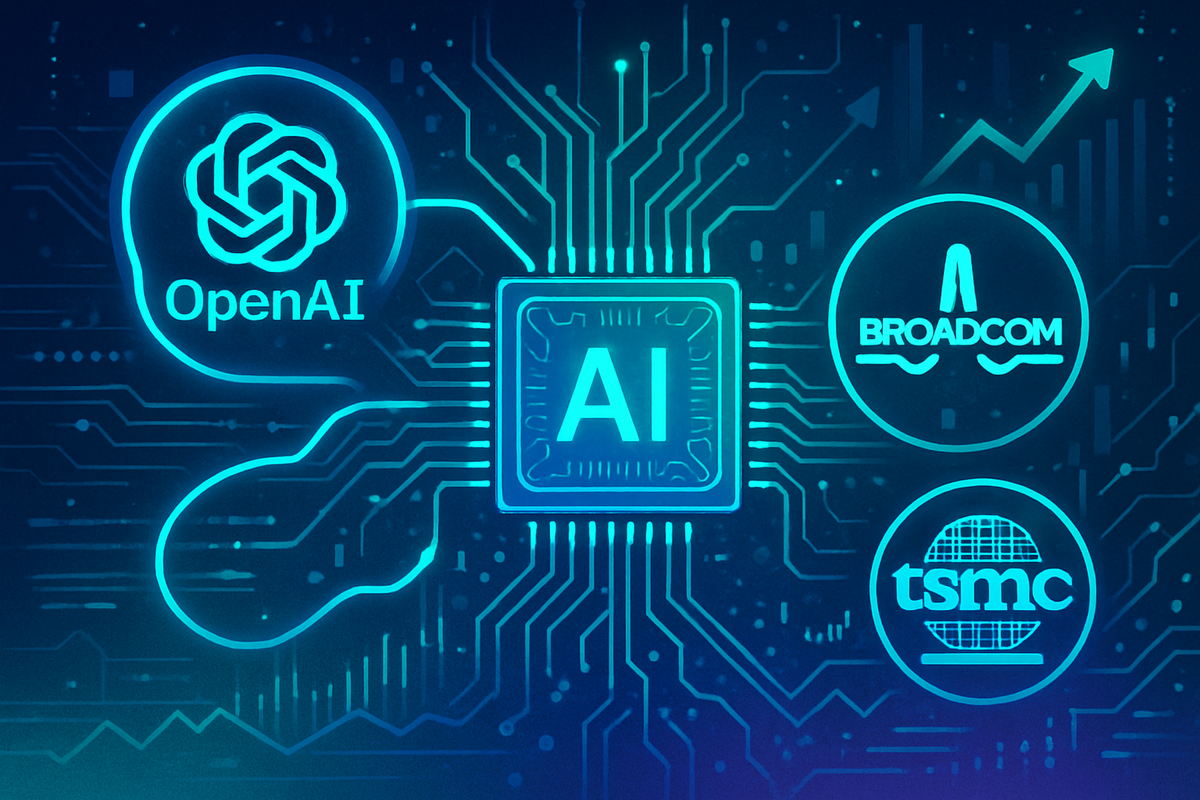
The artificial intelligence landscape is witnessing a seismic shift as OpenAI, the trailblazing force behind ChatGPT, embarks on a strategic partnership with semiconductor giants Broadcom (NASDAQ: AVGO) and Taiwan Semiconductor Manufacturing Company (NYSE: TSM) to develop and fabricate its own custom AI chips. This monumental collaboration, initially reported in late October 2024 with further details emerging in September 2025, signals a decisive move by OpenAI to reduce its reliance on external GPU suppliers, optimize performance for its specific AI workloads, and achieve substantial cost efficiencies in the fiercely competitive AI market.
This ambitious initiative underscores a broader industry trend where leading tech companies are increasingly investing in proprietary silicon to gain greater control over their hardware infrastructure. By designing Application-Specific Integrated Circuits (ASICs) tailored for AI inference tasks, OpenAI aims to unlock new levels of performance and efficiency, potentially reshaping the economic models of large-scale AI deployment and intensifying the race for AI hardware dominance.
The Genesis of a Strategic Alliance
The core of this transformative partnership sees OpenAI spearheading the design of its custom AI ASICs, with Broadcom stepping in as the primary design partner, leveraging its extensive expertise in custom silicon development. The manufacturing prowess will be provided by TSMC, the world's leading independent semiconductor foundry, which will fabricate these cutting-edge chips using its advanced 3-nanometer process technology. This three-way alliance is a testament to the complex, multi-faceted nature of modern chip development, requiring specialized skills from design to fabrication.
While the partnership was first brought to light through various industry reports in late October 2024, significant confirmations regarding the scale of the contract and projected production timelines surfaced in September 2025, making this a highly current and impactful development. The strategic focus of these in-house chips is primarily on "inference" tasks – the process where a trained AI model processes new data to make predictions or decisions in real-time. This specialization is a calculated move to enhance efficiency and significantly reduce the high operational costs associated with running large language models like ChatGPT. Reports suggest Broadcom secured a substantial $10 billion contract from OpenAI for the design and production of these custom AI chips, highlighting the immense financial commitment and anticipated scale of this endeavor.
Market Repercussions: Winners, Losers, and Shifting Tides
This strategic alliance is poised to create distinct winners and losers within the semiconductor and AI industries. Broadcom (NASDAQ: AVGO) emerges as a clear victor, solidifying its position as a critical player in the custom AI chip market. The reported $10 billion contract from OpenAI is a massive endorsement of its ASIC design capabilities, promising significant revenue streams and further entrenching its role in the high-growth AI hardware sector. Similarly, TSMC (NYSE: TSM) benefits immensely by securing a major client for its most advanced fabrication processes. This partnership reinforces TSMC's status as the indispensable foundry for cutting-edge semiconductors, ensuring continued demand for its leading-edge technologies. OpenAI, of course, stands to gain substantially through optimized performance, reduced operational costs, and greater control over its technological stack, which could translate into faster innovation cycles and improved profitability.
Conversely, the partnership presents a significant challenge to Nvidia (NASDAQ: NVDA), which has long held a near-monopoly in the high-performance AI GPU market. While Nvidia's GPUs remain crucial for AI training, OpenAI's move to custom inference chips directly targets a segment of the market where Nvidia currently dominates. This diversification by a major AI player could lead to a gradual erosion of Nvidia's market share in specific inference workloads, intensifying competition. Other established AI chip developers and smaller hardware startups might also face increased pressure as a major AI customer opts for in-house solutions, potentially narrowing their market opportunities for off-the-shelf components. However, it's important to note that the overall demand for AI hardware is still exploding, so while market shares may shift, the pie itself is growing.
Broader Industry Implications and the AI Hardware Arms Race
OpenAI's foray into custom silicon, facilitated by Broadcom and TSMC, is not an isolated event but rather a strong affirmation of a broader industry trend: the "in-house silicon" movement. Tech giants like Google (NASDAQ: GOOGL), Amazon (NASDAQ: AMZN), and Meta (NASDAQ: META) have already invested heavily in developing their proprietary chips (e.g., Google's TPUs, Amazon's Inferentia and Trainium) to gain competitive advantages, optimize for specific workloads, and enhance supply chain resilience. This partnership signals that even major AI software developers are recognizing the strategic imperative of hardware control.
The ripple effects will be felt across the entire semiconductor ecosystem. It will likely spur further investment in ASIC design capabilities and advanced foundry technologies, benefiting companies capable of providing such specialized services. The focus on inference chips highlights a critical shift: while AI training demands immense computational power, the sheer volume of AI inference tasks (e.g., running ChatGPT queries, powering AI assistants, driving autonomous systems) is expected to grow exponentially, eventually surpassing training demands. This makes the inference market a battleground for efficiency and cost-effectiveness. Regulatory bodies might also begin scrutinizing potential monopolistic practices or supply chain dependencies as the AI hardware market consolidates around a few key players and foundries. Historically, similar moves by tech giants to control their hardware, such as Apple's (NASDAQ: AAPL) transition to M-series chips, have proven highly disruptive and strategically beneficial, suggesting a similar trajectory for OpenAI.
The Road Ahead: What Comes Next?
In the short term, the industry will keenly watch for the successful ramp-up of mass production of OpenAI's custom chips, slated for 2026. Initial performance benchmarks and cost-saving metrics will be crucial indicators of the partnership's success and its potential to disrupt the market. Broadcom and TSMC will be focused on executing their roles flawlessly to meet OpenAI's aggressive timelines and performance targets. OpenAI, in turn, will be integrating these new chips into its data centers, which will require significant software optimization and infrastructure adjustments.
Long-term possibilities include OpenAI potentially offering its custom hardware to other companies or expanding its chip development efforts to include training-focused ASICs, further challenging the status quo. This move could also inspire other prominent AI startups to explore custom silicon, creating a more diversified and competitive AI hardware landscape. Market opportunities will emerge for companies providing specialized cooling solutions, power management, and software tools optimized for custom AI ASICs. Challenges will include managing the immense capital expenditure required for chip development and fabrication, navigating potential supply chain bottlenecks, and ensuring that custom chips can keep pace with the rapidly evolving demands of AI models. Investors should anticipate continued volatility in semiconductor stocks as the market adjusts to these strategic realignments.
A New Chapter in AI Computing
The partnership between OpenAI, Broadcom, and TSMC to develop custom AI chips marks a pivotal moment in the evolution of artificial intelligence. It underscores a clear trend towards vertical integration in the tech industry, where control over hardware is seen as essential for sustained innovation and competitive advantage in AI. The immediate implications point to increased competition in the AI chip market, particularly for inference workloads, and a significant boost for Broadcom and TSMC.
Moving forward, investors should closely monitor the execution of this partnership, particularly regarding production timelines and the performance of the custom chips. The success of OpenAI's initiative could accelerate the adoption of custom ASICs across the AI industry, leading to a more diverse and specialized hardware ecosystem. This event is not just about a new chip; it's about the fundamental re-architecting of how AI is built and deployed, promising profound and lasting impacts on the financial markets and the technological landscape for years to come. The era of generalized AI hardware is giving way to an age of highly specialized, optimized silicon, and this alliance is at the forefront of that revolution.
This content is intended for informational purposes only and is not financial advice.






